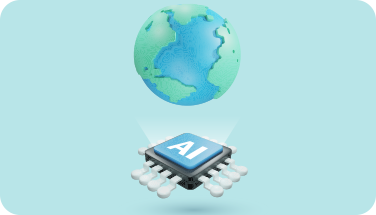How AI is transforming Nonprofits
Artificial Intelligence (AI) has revolutionized industries across the globe, offering opportunities to streamline operations, enhance decision-making, and deliver better experiences to stakeholders.
For Nonprofit organizations, the potential of AI is particularly profound. These organizations, often operating on limited budgets and tasked with achieving significant impact, stand to benefit immensely from AI's capabilities.

Here, we explore how AI is disrupting the Nonprofit industry while highlighting actionable strategies that leaders can adopt to harness its potential effectively.
The impact of AI on Nonprofit organizations
AI's practical applications extend far beyond automation and advanced data analysis, although these remain a core component. For Nonprofit organizations, AI addresses several challenges:
- Enhanced decision-making: AI algorithms can analyze vast amounts of historical and real-time data to offer actionable insights. This is crucial for organizations looking to optimize their fundraising strategies, allocate resources effectively, or target services where they are most needed.
- Operational efficiency: Manual tasks, such as processing applications, managing financial reports, or responding to inquiries, can now be automated. This reduces administrative overhead and allows teams to focus on value-driven tasks that directly support their mission.
- Stakeholder engagement: AI-driven chatbots and communication platforms can offer donors, beneficiaries, and stakeholders real-time support and personalized experiences, improving relationships and trust.
- Predictive analysis: Acting proactively rather than reactively can significantly impact the success of a Nonprofit or Public Sector initiative. AI-powered predictive analytics helps leaders identify trends, anticipate challenges, and prepare for future demands before they occur.
Navigating the challenges of AI adoption
Despite AI's many advantages, organizations must proceed mindfully, as its adoption presents several challenges, particularly for Nonprofits that may lack deep technological expertise or substantial financial resources.
1. Data limitations
Many Nonprofits lack access to expansive, high-quality datasets that AI models require for training and optimization. Leaders must prioritize strategies for acquiring, managing, and utilizing data responsibly, ensuring compliance with privacy laws and ethical considerations.
2. Budget constraints
Implementing AI tools can demand significant initial investment. From procuring technology to training staff, budgets need careful consideration. Nonprofit leaders must seek scalable, cost-effective solutions and collaborate with technology vendors offering affordable, sector-specific tools like Unit4's cloud-based platforms.
3. Skill gaps and resistance to change
Successful AI adoption requires staff buy-in and adequate training. Rolling out new technologies can lead to uncertainties among employees about job displacement or the complexity of using these tools. Leaders should invest in upskilling their teams and emphasize how AI augments rather than replaces their efforts.
4. Ethical considerations
AI systems must align with ethical guidelines, especially in mission-driven sectors. Leaders must ensure their AI tools operate transparently, avoid biases, and respect organizational values and stakeholder rights.
Click to read Helping nonprofits deliver on their mission with FP&A and HCM Gated
Strategies to integrate AI effectively
To optimize the integration of AI, Nonprofit leaders should consider the following steps:
1. Define clear use cases
Identify specific areas within your organization that AI could optimize, such as donor engagement, budget forecasting, or beneficiary outreach. Establishing clear objectives ensures AI is applied appropriately and effectively.
2. Leverage sector-specific technology
Partnering with technology providers experienced in working with Nonprofits, like Unit4, simplifies implementation. These providers understand sector-specific challenges and deploy solutions that align with your needs.
3. Start small and scale gradually
Piloting AI in a specific function allows organizations to measure performance and learn best practices before scaling up. For example, deploying AI to manage transactional donor emails is a manageable starting point.
4. Invest in training and transparency
Ensure that all employees and stakeholders understand how AI systems work and their overarching purpose within the organization. Address any concerns to foster trust and collaboration.
5. Prioritize data quality
Strong AI performance relies on clean, well-organized data. Commit resources to improve your organization's data governance practices to maximize the value of AI insights.
Looking ahead
AI is no longer a futuristic concept; it is a reality that already influences how organizations operate and thrive. Nonprofits at the forefront of AI adoption have begun experiencing the benefits of increased efficiency, improved decision-making, and stronger stakeholder relationships.
However, success lies not in adopting AI for the sake of innovation but in using it thoughtfully to fulfill mission-driven objectives. By addressing challenges and implementing AI with purpose, Nonprofit leaders can transform their organizations into agile, impactful entities that achieve measurable outcomes at scale.
Are you ready to explore how AI can empower your organization? You can check out Unit4’s integrated suite of solutions here or talk to sales today to discuss solutions designed specifically for Nonprofits.





